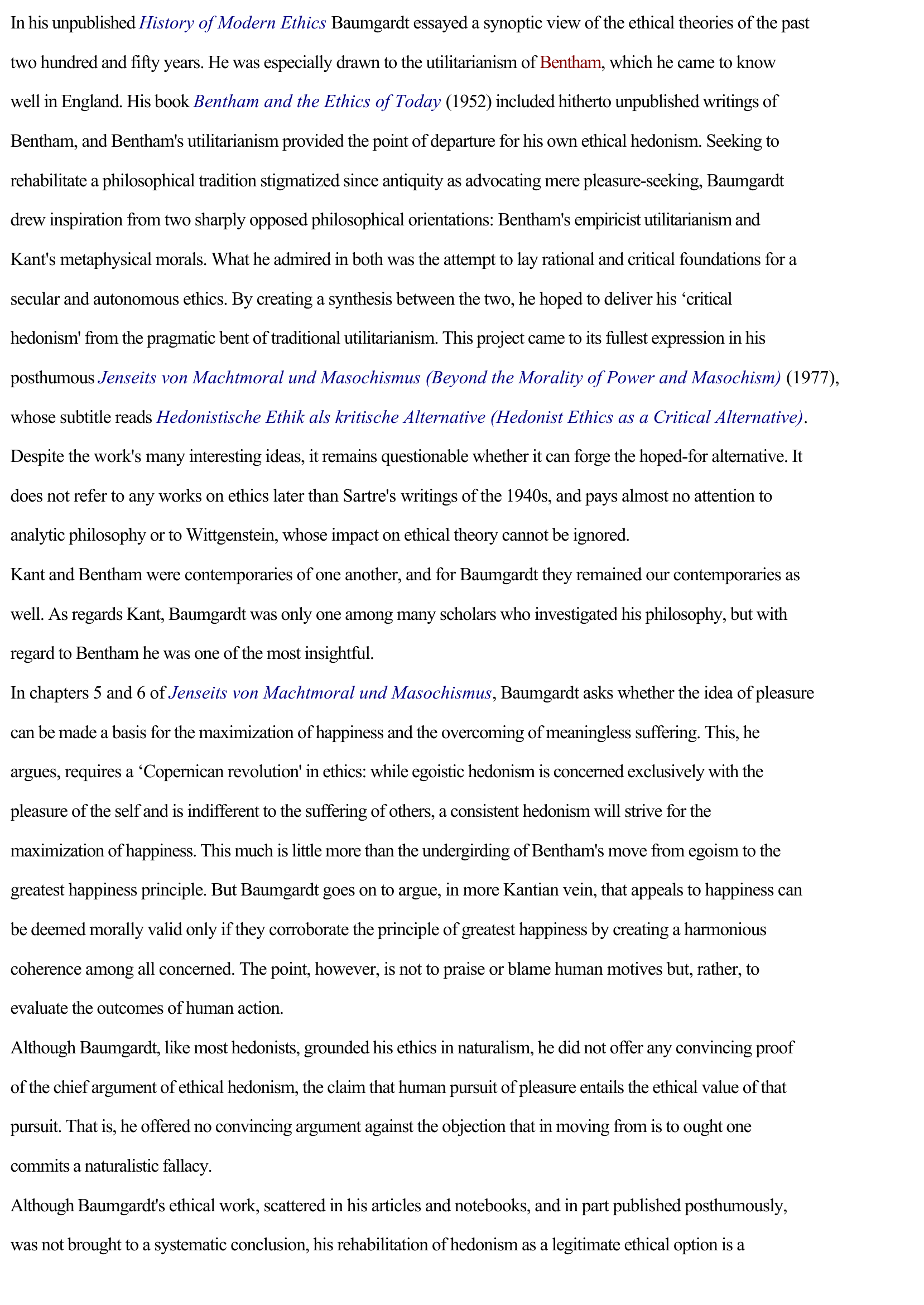Baumgardt, David
Publié le 22/02/2012

Extrait du document
«
In his unpublished History of Modern Ethics Baumgardt essayed a synoptic view of the ethical theories of the past
two hundred and fifty years.
He was especially drawn to the utilitarianism of Bentham , which he came to know
well in England.
His book Bentham and the Ethics of Today (1952) included hitherto unpublished writings of
Bentham, and Bentham's utilitarianism provided the point of departure for his own ethical hedonism.
Seeking to
rehabilitate a philosophical tradition stigmatized since antiquity as advocating mere pleasure-seeking, Baumgardt
drew inspiration from two sharply opposed philosophical orientations: Bentham's empiricist utilitarianism and
Kant's metaphysical morals.
What he admired in both was the attempt to lay rational and critical foundations for a
secular and autonomous ethics.
By creating a synthesis between the two, he hoped to deliver his ‘critical
hedonism' from the pragmatic bent of traditional utilitarianism.
This project came to its fullest expression in his
posthumous Jenseits von Machtmoral und Masochismus (Beyond the Morality of Power and Masochism) (1977),
whose subtitle reads Hedonistische Ethik als kritische Alternative (Hedonist Ethics as a Critical Alternative) .
Despite the work's many interesting ideas, it remains questionable whether it can forge the hoped-for alternative.
It
does not refer to any works on ethics later than Sartre's writings of the 1940s, and pays almost no attention to
analytic philosophy or to Wittgenstein, whose impact on ethical theory cannot be ignored.
Kant and Bentham were contemporaries of one another, and for Baumgardt they remained our contemporaries as
well.
As regards Kant, Baumgardt was only one among many scholars who investigated his philosophy, but with
regard to Bentham he was one of the most insightful.
In chapters 5 and 6 of Jenseits von Machtmoral und Masochismus , Baumgardt asks whether the idea of pleasure
can be made a basis for the maximization of happiness and the overcoming of meaningless suffering.
This, he
argues, requires a ‘Copernican revolution' in ethics: while egoistic hedonism is concerned exclusively with the
pleasure of the self and is indifferent to the suffering of others, a consistent hedonism will strive for the
maximization of happiness.
This much is little more than the undergirding of Bentham's move from egoism to the
greatest happiness principle.
But Baumgardt goes on to argue, in more Kantian vein, that appeals to happiness can
be deemed morally valid only if they corroborate the principle of greatest happiness by creating a harmonious
coherence among all concerned.
The point, however, is not to praise or blame human motives but, rather, to
evaluate the outcomes of human action.
Although Baumgardt, like most hedonists, grounded his ethics in naturalism, he did not offer any convincing proof
of the chief argument of ethical hedonism, the claim that human pursuit of pleasure entails the ethical value of that
pursuit.
That is, he offered no convincing argument against the objection that in moving from is to ought one
commits a naturalistic fallacy.
Although Baumgardt's ethical work, scattered in his articles and notebooks, and in part published posthumously,
was not brought to a systematic conclusion, his rehabilitation of hedonism as a legitimate ethical option is a.
»
↓↓↓ APERÇU DU DOCUMENT ↓↓↓
Liens utiles
- T. C. 30 juill. 1873, PELLETIER, Rec. 1er supplt 117, concl. David (D. 1874.3.5, concl. David)
- David DIOP
- David Olère: l'univers concentrationnaire
- David Hume - Sur la diversité des goûts - méthode de l'explication de texte
- La mise en scène de David Bobbé : Adaptation ou création ?

































